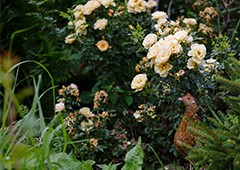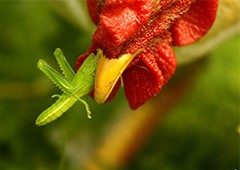December?! We hear you cry. Yes as bewildering as it may seem, the final month of the year and the first month of summer is well and truly upon us.
Summer is the month of outdoor entertaining in the southern hemisphere thanks to long balmy afternoons that turn into crisp and cool nights- the perfect atmosphere for afternoon drinks and games of bocce that extend well into the later hours.
But of course to be able to impress at your next garden party or BBQ bonanza it is a must that your garden is in tip top shape from your soil to your shrubs.
Follow this guide to ensure that your produce is ripe for the picking and your backyard is set to impress this for the month of December.
Vegetables and Herbs
There’s nothing quite like enjoying the crisp crunch of a carrot or the juicy burst of a bright red tomato that has been picked from your very own garden. To keep your veggies vibrant and thriving throughout the warmer month of December they do require a little specific care.
- Temperate & Cool Areas
Despite not reaching soaring temperatures, it is still important that your veggie patch is tended to on a regular basis. This means daily watering (if you are having a particularly warm day it is best to do this in the morning), as well as regular weeding. This will ensure your veggies are at their best for all those salad recipes you have planned for the summer!
If you are wanting to extend your spring harvest right through the end of summer, plant some more tomato, cucumber and bean crops. They will continue to thrive, meaning you will have plenty of fresh produce at the ready for months to come.
It’s a great idea to invest in a shade cloth for your veggie patch- almost like sunscreen, it will help to protect your produce from UV rays on particularly hot days.
No barbecued meat is complete without a sprinkling of herbs- even better if you can pluck them straight from your very own herb garden, after all- fresh is best! Try potting basil, parsley, lemongrass and mint, for a lovely array of flavour options. It is best to put the mint in a pot on it’s own as it will grow like wildfire! (So you should have plenty for summer mojitos by the pool!).
- Tropical & Warm Areas
If you live in an area where temperatures regularly soar to above 35 degrees, and humidity levels are a bit steamy, it is important that you first and foremost take care of yourself when gardening. If you plan on spending a day getting your green thumb a little muddy, be sure to wear plenty of sunscreen, cloth in a long sleeved shirt, ALWAYS wear a hat and be sure to drink plenty of water. There’s not much point in having lots of lovely fresh produce if you are too unwell to enjoy it!
While admittedly some crops will struggle with high heat & humidity in some parts, you can still have your veggies and eat them too if you choose wisely! Capsicum, chilli, eggplant and cucumbers will all bear the heat surprisingly well as long as you are prepared to give them a little TLC. Be sure they are never left thirsty, are fed some liquid fertiliser, top up their mulch regularly and prune when needed!
Fruit
Summer is the month to celebrate fruit! There is no better way to spend a lazy Sunday afternoon then munching on a deliciously ripe and rich mango by the pool- this really is the essence of an Aussie summer. So to make sure you have an abundance of fresh fruit at the ripe and ready for pool parties or the like, read on…
- Temperate & Cool Areas
Fruit flies- these little demons are one of the most detrimental insects to your fruit garden, so it is important to protect against them. Use a good quality fruit fly bait or trap- we have found organic is generally best- for you, your plants, but not for dreaded fruit flies.
Other nasties you need to look out for on your fruit crops are stink bugs, aphids, scale and mealybugs. If they are found (make sure you are wearing gloves), pluck them from your precious plants, then squash, bag and discard them, so your fruits can reside in harmony.
- Tropical & Warm Areas
Sometimes, tropic dwellers deal with a war going on in their very own backyard between the birds and the bats over who can snare your sweet goods! To prevent this problem, invest in a white knitted netting that should keep your fruit growing freely, and pesky wildlife out! This will mean that your fruit trees will require regular pruning to keep them low enough to be protected.
Of course you can’t always win the war, and often you will find some fruit just doesn’t want to bloom to it’s full potential. That doesn’t mean you should discard your imperfect produce straight away - why not turn them into a jam or chutney instead. Bottle them up add a ribbon or two, and you have the perfect stocking filler for virtually everybody!
If you have been in the fruit game for a while and your little patch has been blossoming for some time, December is the month to harvest your delicious pawpaw, pineapple and mango.Then throw them together for a bright, flavoursome and fresh fruit salad- yum!
Compost & Soil
They may not be pretty, smell nice or taste a treat- but without healthy compost and soil our gardens would be very sad indeed! So to keep the circle of life in your backyard thriving, remember to keep your compost and soil happy!
- Temperate & Cool Areas
Summer is the perfect time to make a big batch of lovely compost! Take all your garden waste, lawn clippings (both green and brown) and some garden scraps you can steal from your chickens and get composting! Because compost can dry out in warm weather, you will need to spray it with a hose from time to time to keep it moist- they key word here being ‘moist’, NOT wet.
When using compost and mulch on your garden, it is best to do this after watering as it will absorb the nutrients more creating a bustling and beautiful garden!
- Tropical & Warm Areas
Tropical areas will experience a lot of rain during December and throughout the summer months, so it is important to replenish nutrients that can be lost to torrential downpours. Using tropical-strength fertilisers and covering soil with your homemade mulch and compost will help protect your plants from the sometimes relentless rain that can spell disaster for your garden.
With this in mind, gardening is suppose to be a relaxing and stress-free activity, so keep calm and do a little bit each day to do to avoid being overwhelmed and thrown into a spin. Before you know it you’ll be cooking up your fresh produce plucked straight from your garden and be the envy of all your barbecuing going guests!

















